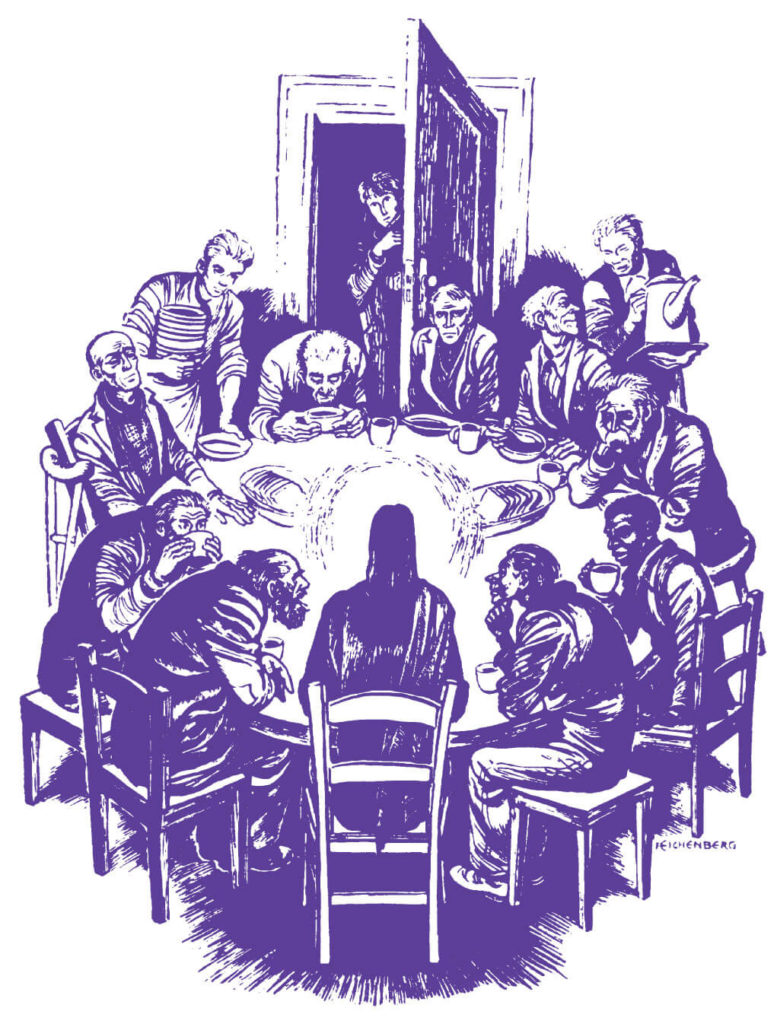
On his journey to Jerusalem with the men and women who are following him, Jesus meets a man with a basic question about his purpose and destiny, “What must I do to receive eternal life?”
In his lifetime, Jesus was an itinerant preacher, who possessed no belongings and owned no home. Jesus sent his disciples out in the same way — with no food, money, bags, or second tunic.
Are all of Jesus’ followers to live this way? In the 40 years between Jesus’ public ministry and Mark’s writing of the first gospel, Christian communities faced questions Jesus did not answer. Not surprisingly, they held conflicting views as they tried to live Jesus’ teachings and follow his example.
Like the rich young man, the Christians for whom Mark writes in A.D. 70 struggle with issues of wealth and human purpose. This problem persists and worsens in our world.
In our global neighborhood news travels fast about people’s needs. As a nation and as individuals the U.S and its citizens respond generously. With climate change we face new problems. We would need four Earths if everyone in the world lived our North American lifestyle.
- What that we have in the U.S. do you wish everyone on the planet had?
- What might we learn from people who are poor about how to change our lifestyles?
Several points of view about wealth gather around this young man’s conversation with Jesus. In literary form, this gospel passage is a paradigm (para-dime), a controversial question in a simple narrative setting.
A paradigm works like a graffiti wall or a blog post. It poses a question that invites dialog among varying points of view; Sunday’s gospel has three points of view about how to gain eternal life.
The young man represents the first point of view. He keeps the commandments. In the community for whom Mark wrote, he represents the Christians who continue to value the ten commandments they learned to keep as Jews. The commandments offer a common standard of goodness Christians still hold today.
The second point of view is more radical, “Go and sell all you have and give to the poor; then come, follow me.” Some Christians took Jesus’ own example literally. Some among the first Christians in Jerusalem sold their possessions and lived a community life (Acts 2.45).
Early Christian missionaries like Jesus’ first disciples imitated Jesus’ itinerant lifestyle. They depended on the hospitality of settled, propertied Christians for food and shelter in the towns where they preached.
The third viewpoint holds that everything is possible with God. We don’t know how the rich young man lives the rest of his life. All of us have to identify how we are rich and how we are poor, how and in whom we want to invest our money and ourselves. All of us live within the mystery of God’s love in which the next person we meet may change our lives forever.
- How are you rich? How are you poor?
In his concern for people who are poor, Pope Francis imitates his namesake and the revolutionary document at the Second Vatican Council that reconnected the Church with the world and its problems, Gaudium et Spes. It calls the whole church to do “one thing more,” to act in solidarity with the poor and afflicted of our planet. The Constitution on the Church in the Modern World recognizes how interdependent the people of the planet are.
The Council reiterates the dignity of the human person and each person’s rights to food, shelter, clothing, education, and health care. These rights impose corresponding duties — that we are our brother’s and sister’s keepers, that we work for the common good and well-being of all.
The document defines the common good, “the sum total of social conditions that allow people, either as groups or individually, to reach their fulfillment more fully and more easily. …Every group must take into account the needs and aspirations of every other group, and still more of the human family as a whole”(#26).
The common good includes future generations, Pope Francis points out. “We can no longer speak of sustainable development apart from intergenerational solidarity” (Laudato Si’ #159).
The riches that don’t disappear arise out of our love of neighbor, Pope Francis reminds us. Jesus “gives us two faces, or better yet, the face of God reflected in so many other faces. For in every one of our brothers and sisters, especially the least, the most vulnerable, the defenseless, and those in need, God’s very image is found” (#61). These are the riches that endure.
- What more does Catholic social teaching ask of you today in your life?
